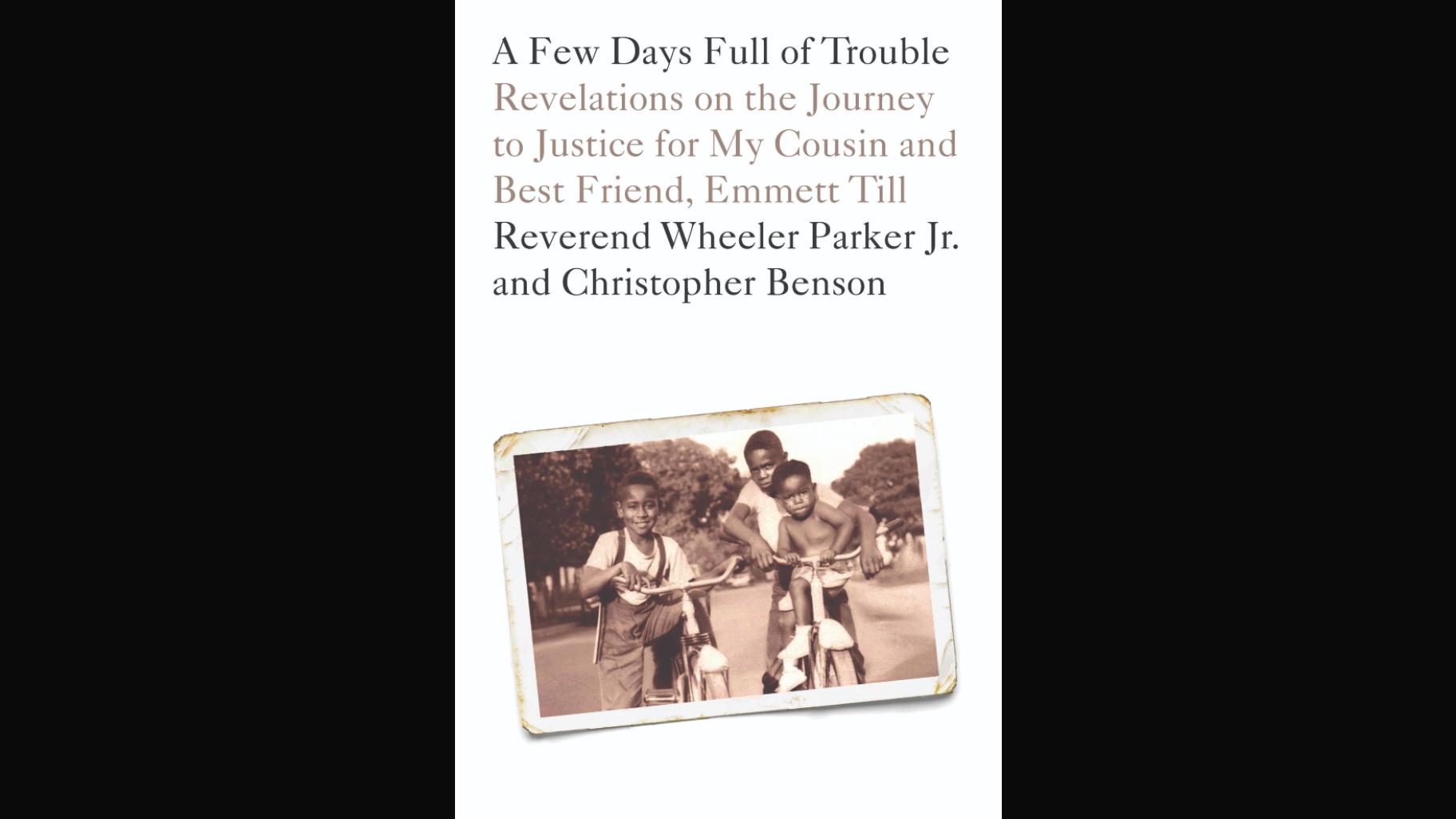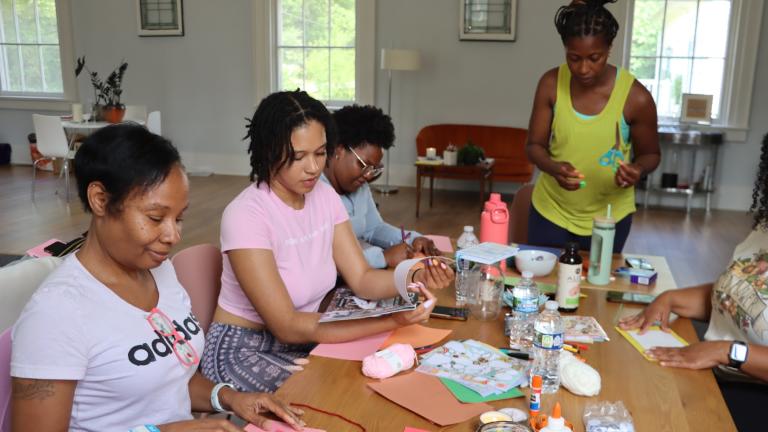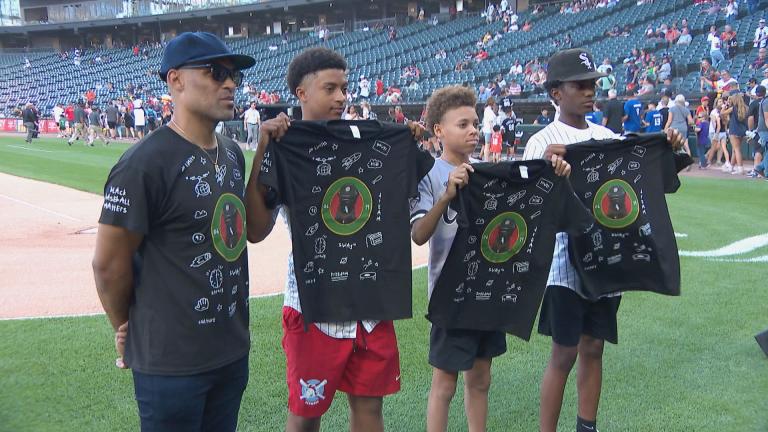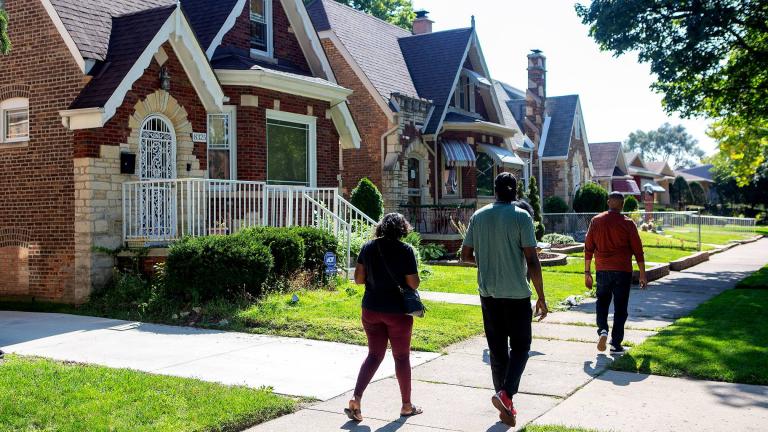As the country honors the Rev. Martin Luther King Jr.’s legacy this week, a book about a seminal event in American history — an event that motivated King's fight for civil rights — was released. In “A Few Days of Trouble: Revelations on the Journey to Justice for My Cousin and Best Friend, Emmett Till,” the Rev. Wheeler Parker Jr. gives a firsthand account of those terrible days. With his co-author, Christopher Benson, Parker also gives an inside look at the decades of investigations into Till's lynching.
Parker is the last surviving witness to Till’s 1955 kidnapping and murder, and he said that he hopes to correct the narrative about his cousin with this book — a narrative that began with an article in Look magazine published shortly after the trial of Till’s killers, J.W. Milam and Roy Bryant.
“Right away after he was killed, I read the Look magazine piece and that disturbed me, and it has disturbed me for 67 years how they portrayed him,” Parker said. “I had to live with that the portrayal that they gave him all these years. And that's the thing I want most to see done.”
“It was painful to see how Emmett Till was described by someone who couldn't possibly have known him and playing on the stereotypes of a young Black kid coming out of Chicago,” Benson said. “So those are the kinds of things we attempt to correct, to humanize Emmett Till, to show what we lost with respect to his precious life and the gifts that he had to share with the world and to use that as a representative case of what racism has cost us in this country.”
Parker said he also wants people to know the Till whom he called “Bobo.”
“Fun-loving, prankster, never had a dull day in his life,” Parker said. “Center of attraction, even with all the stuttering. I say he's a typical Leo. He would have been a leader … wherever he would have gone. He was a natural leader.”
The book notes that civil rights leader Dr. T.R.M. Howard was the catalyst for King and Rosa Parks to learn more about Till’s story.
“At the start of the mass movement, he would go out and talk about the Emmett Till case,” Benson said. “He gave speeches, and one of those was at the Dexter Avenue Baptist Church in Montgomery, and in attendance was Rosa Parks and, of course, Dr. Martin Luther King Jr.”
Parker and Benson said the book offers context for the sociopolitical environment of the time and place in which Till was killed.
“The story of Emmett Till is about more than Emmett Till, as horrible as his lynching was,” Benson said. “It's about the expression of power in this country. Emmett Till and Wheeler Parker Jr. went down to Mississippi just after Brown vs. Board of Education was decided. And white people in the Delta were up in arms thinking they were going to have to share power now, respect equality among Black people, and they were pushing back. That's the environment that Emmett Till walked into, unprepared for that.”
“It's hard to imagine that people were killed for ‘reckless eyeballing’ — but that's the kind of conditions we lived under,” Parker said.
Benson has worked alongside Parker, Till’s extended family and activists to get legislation named in honor of Emmett Till passed. That includes the Till Unsolved Civil Rights Crime Act in 2008, its reauthorization in 2016 and the Emmett Till Anti-Lynching Act, which was signed into law in late 2022.
“It's important to have people in power make a statement with these kinds of laws that the crimes that the laws address are not going to be accepted, they're not going to be tolerated,” Benson said. “Symbolically, we see some significance in the fact that these two laws carry Emmett Till's name because from now on, whenever anybody is charged under these laws, it'll be Emmett Till speaking, right? That's his legacy. His legacy is that he can accuse people now of the horrible crimes that he had to suffer through.”
Despite those legislative victories, ongoing investigations and some more recent sensational revelations, no one involved in Till’s lynching has been successfully prosecuted to date. Asked what justice for his cousin and childhood best friend would be, Parker takes the long view.
“Justice for us, in our sense, is to serve humanity,” Parker said. “I think about all the things that come about because of his death. At the same time, I go back to the way he died, how he suffered, the screaming, the beating, and it makes me think: Was the pleasure worth the strain, to have all these bills and things named after him? So it's kind of a mixed emotion I have, but we’re content that everybody reaps what they sow. We’re people of faith, and we believe the Bible. We practice it. And that's what we live by.”
Read an excerpt from the book below.
 "A Few Days Full of Trouble" by the Rev. Wheeler Parker, Jr.
"A Few Days Full of Trouble" by the Rev. Wheeler Parker, Jr.
1
White Lies
The year 2017 started off with a lie and a confession. First, the lie. It was told by Donald Trump—a small thing, really, but a big deal to him. He claimed that the crowd attending his January 20 presidential inauguration was the biggest ever, even though the entire nation saw a different picture in an aerial photo showing vast empty spaces on the Capitol Mall where the inaugural crowd stood. That was just the first of more than thirty thousand false or misleading statements by Trump that would be documented by The Washington Post over the next four years.
It was the confession revealed that January, though, that wound up dominating the attention of so many of us. At the center of it was a much bigger lie than the one Trump told. It was the lie that had cost the life of Emmett Till in August 1955, the lie that forever changed the lives of all the rest of us: Bobo’s family, friends, other African Americans, people all across the country who were not related but were connected anyway by race and the threat of racial violence. This lie changed the course of our history.
The confession was published in news stories about the soon-to-be released book The Blood of Emmett Till, written by Duke University senior scholar Timothy Tyson. Right there in chapter 1, on page 6, first paragraph, last line, was a four-word revelation by Carolyn Bryant Donham: “That part’s not true.”
The part that’s “not true,” Tyson told us in the book, is the part a twenty-one-year-old Carolyn Bryant testified to under oath in the 1955 murder trial of her husband, Roy Bryant, and her brother-in-law J. W. Milam. The part about how she claimed Bobo accosted her in Bryant’s Grocery and Meat Market in Money, Mississippi, how she swore he grabbed her and propositioned her. The story she must have practiced for several weeks before she told it and acted it out in a white-hot Tallahatchie County courtroom in the Mississippi Delta on September 22, 1955.
“This nigger man came in the store and he stopped there at the candy case,” she said from the wicker witness chair back then. With coaxing by Sidney Carlton, one of the five defense attorneys representing her husband and his half brother, nudging her through her story, she went on from there. After this “man” picked out his candy, she said, she held out her hand for the money. “He caught my hand,” she said, with a “strong grip.” While he was holding on to her hand and before she “jerked it loose,” he said, “How about a date, baby?” Frightened, she swore in her courtroom testimony that she ran toward the back of the store and “he caught me at the cash register” where “he put his left hand on my waist, and he put his other hand over on the other side.” That’s when she claimed he spoke again. “What’s the matter, baby. Can’t you take it?” And, after freeing herself, “You needn’t be afraid of me.” And then, he boasted to her that he had had sex “with white women before,” although she claimed he used an unprintable word to describe “sex.” That’s when “this other nigger came in the store and got him by the arm.” He turned around and said, “Goodbye.” She said she ran from the store to get her pistol from the car outside.
That’s when it happened. The one thing all the stories about this moment have in common. Emmett Till whistled. The wolf whistle that echoed for years in the many stories that were told about her story and about Bobo.
Hers was a lie that was meant to justify the brutal ritualistic torture and lynching of a fourteen-year-old—as if anything possibly could justify that. Fortunately, Judge Curtis Swango dismissed the jury before she told this story. Unfortunately, he did not dismiss the angry capacity crowd of White spectators, who got the word to the jurors. According to the Tyson book, what she was saying now was that what she said back then in a court of law was “not true.”
That revelation came as a shock, but not as a surprise. The shock was that she finally was telling the truth. But we were not surprised by the truth she told. We’d all known it to be true for so many years—those of us who were there standing around on the porch outside the store, who knew what didn’t happen in that store on that day or any other day. Those of us who knew Bobo had a severe stutter and couldn’t say all those words. And yet even though we always believed the truth would be told one day, we still were shocked by the telling on the day it finally was told.
The public reaction was exactly what you might expect. And what you might never expect.
For my part, there was great joy, satisfaction that the true story finally was being told, that Emmett Till had been exonerated. He had done no wrong. From then on, when I would go out to tell the story, I would not be confronted by people suggesting that my cousin got what he deserved. Yeah, people actually have said that, or suggested it with their skeptical expressions. One such experience happened at my own high school when I was invited to talk about the story and my personal connection to it. One male student asked, “Why are we here? Till misbehaved.” That kind of reaction is so disturbing to me, for obvious reasons that go beyond my own personal relationship. First, the facts had been distorted. Second, even if you believed that Bobo had been out of line, what about due process? Some process that might investigate claims and decide on the appropriate punishment. Instead, dismissing Bobo as a wrongdoer who deserved what he got basically is a way of supporting people who take the law into their own hands. In my experience as a public speaker, there are many people out there who seem to accept that idea.
That is part of the reason why I had been suffering on multiple levels for so long, trying to convince people that I was the one telling the truth. That even though the media kept repeating the story Carolyn Bryant had told, that didn’t mean it was true. So I felt a deep sense of relief that Timothy Tyson finally had gotten this woman to admit that she had lied. Even so, while there was great joy in the revelation, there was great sorrow just because of the reminder of the injustice. The reaction to that injustice is what led to the position taken by so many others after hearing the news, including members of our extended family. As you might expect, there were calls to go after Carolyn. Investigate. Prosecute. Lock her up. No doubt about it, I definitely wanted justice, too. I mean, no one should get away with murder, or with playing a role in a murder. Any role at all. Anybody at all. No matter how old they might have become. But what did justice require at that point in 2017, some sixty-two years after Emmett Till was murdered? What did justice mean for the survivors, the family members, who have lived with the unbearable grief of loss every day since? How does our system compensate for something like that?
What about others who have come to learn about their own place in our society—their lower status—by way of the Emmett Till story? So many others over the years limited their options for fear they’d be punished for stepping out of their assigned place, for simply trying to behave as equals.
Would locking up Carolyn Bryant Donham—in the court of public opinion, if not a court of law—balance the scales, make it all even out somehow? As far as I was concerned, there was a certain amount of justice even in that. The full spectrum of these views was covered by the news media. As you might expect, members of my family were asked for our reaction. “I was hoping that one day she would admit it, so it matters to me that she did, and it gives me some satisfaction,” I told The New York Times. My interview with WTTW, the PBS station in Chicago, went even further. Brandis Friedman, host and correspondent for the station’s Chicago Tonight, spent quite a bit of time going deeper with our family, as she had a couple of years earlier during her coverage of the sixtieth anniversary of Bobo’s lynching.
Among other things, I talked about the power of the lie that gave Bobo’s killers “the justification” to do what they did, since that lie fed into the racist narrative of African American men “portrayed as rapists,” I said. “So now my cousin can be painted in a different light.”
Cousin Ollie Gordon talked about how the enduring pain of our family mirrors the pain of so many other Black families. “Each time a book comes out, or the story of a movie comes out, wounds are reopened in our family,” she said, fighting back the tears. “Subconscious grief comes back. Sure his mother’s gone, but her spirit lives within me,” she continued, referring to Emmett’s late mother, Mamie Till-Mobley. “I don’t think a day went by that she didn’t cry.”
That last point really hit me. It resurrected so much of what had been buried deep inside me. You see, for so many years, I couldn’t cry. But in recent years, it seemed, I couldn’t stop crying. Clearly, the pressure had been mounting—the pressure of convincing people of the truth when they had been so influenced by the lies, the pressure now to see where this revelation might lead us. Was legal justice even a possibility?
Excerpted from A Few Days Full of Trouble by Reverend Wheeler Parker, Jr. and Christopher Benson. Copyright © 2023 by Reverend Wheeler Parker, Jr.. All rights reserved. No part of this excerpt may be reproduced or reprinted without permission in writing from the publisher.








